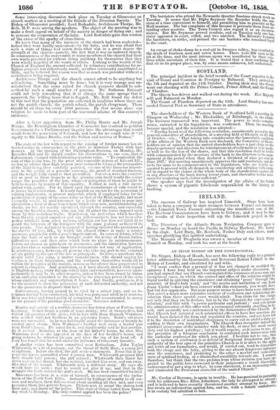AN IRISH BISHOP ON THE CONFESSIONAL.
Dr. Singer, Bishop of Meath, has sent the following reply to a printed letter addressed by the Honourable and Reverend Robert Liddell to the Bishop of London, and circulated far and wide. "I must confess that a perusal of it has not changed or modified the opinions I have long held on the important subject under discussion. If you had argued that our Church contemplated the existence of some rare and exceptional eases, in which the counsel and office of the minister might be found useful in quieting the conscience and obtaining peace through ministry of God's holy word,' and the merits and mediation of our Lord Jesus Christ'—had you been content with this statement, you would have had but few opponents. But your purpose seems to have been very different. You assert a much more extensive exercise of confession and ministerial ab- solution than those special cases would admit. You claim for the clergy not only that they are to declare, but to be the channels for conveying ab- solution,' and that with a power particular and judicial ; ' and you invest the administration of this office with a ceremonial solemnity startling in it- self and assuredly not countenanced by the formularies of the Church. If that Church had intended such ministerial offices to have her sanction she would have dictated the form and regulated the exercise, and not have left it to the discretion of individual clergymen to carry out so awfu a duty cording to their own imaginations. The Church does recognize indeed the spiritual intercourse of the minister with his flock, at once his most sacred duty and his highest privilege ; but it would require, as it seems to me, all the prejudice of a foregone conclusion to confound such intercourse with the auricular confession for which you plead. I hesitate not to say, that such a system of confession is as devoid of Scriptural foundation and the authority of the best ages of the primitive Church as it is alien to the sprit and letter of our formularies, and would, if carried out, tend to demoralize both the clergy and the laity, giving to the one almost dangerous influence over the conscience, and producing in the other a morbid and unhealthy state of spiritual feeling, or a diminished sensibility towards sin. I cannot, therefore, but think that the two prelates from whose decision you have.sp- pealed to the public have exercised in their judgments a sound discretion, endeavoured to put a stop to what, by your statement, is an increasing evilp and vindicated the Protestant character of the united Church."
Mr. Carden of Barnane, is again in trouble. He has persisted in purelli11 . with his addresses Miss Ellen Arbuthnot, the lady he attempted to abduct, and is believed to have recently threatened another attempt by force. She has sworn an information against him, and he, with a female confederate, is in custody but admitted to bail.


























 Previous page
Previous page